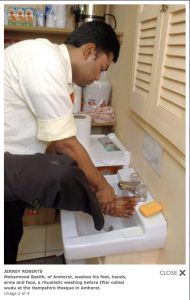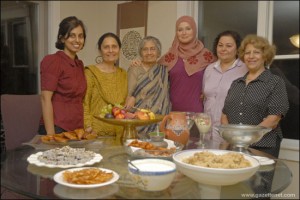Supporters of Dr. Hazratji and Hampshire mosque recently met at the temporary musallah in Amherst to offer a traditional Muslim ‘goatze’ greeting to the community.
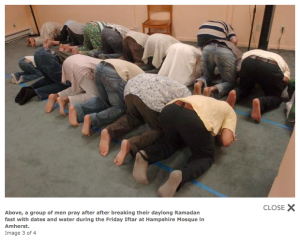
Hampshire mosque supporters of Dr. Hazratji extend the traditional Ramadan greeting to the Hampshire County kufar community.
Ramadan ritual: A small but devoted Muslim congregation gathers in Amherst
(original story Ben Storrow – August 19, 2011 – Gazettenet.com)
It’s Monday night, just after sunset, and Irum Dean is sitting down to his first meal since sunrise. Wearing a backward Red Sox hat, its visor uncreased, a dark T-shirt and a pair of brightly colored baggy plaid shorts, he is sitting on the floor, among a dozen or so men, some old, others young. A few wear long, flowing white robes, others are dressed in polo shirts and khakis.
They come from a variety of backgrounds: some were born in Southeast Asia, others the Middle East and others still here in the United States. They talk amiably among themselves, eating from the heaping plates of rice, kebab and salad before them. In the back of the room, a small clutch of women do the same. All have just completed their daily prayers.
Collectively, the nearly two dozen congregants of the Hampshire Mosque gathered here on the second floor of the Carriage Shops on East Pleasant Street, have just broken their daily fast. It is the Ramadan, the Islamic holy month, during which adherents forgo food and drink during the daylight hours.
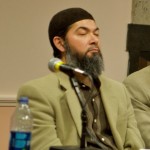
Dr. Ali Hazratji – Violence, bloodshed, and warfare are prescribed for all Muslim Five College Students – whether they like it or not.
“The main purpose of Ramadan is to become closer to God, to become more conscious of him as creator and sustainer,” said Dr. Mohammed Ali Hazratji, a neurologist and president of the mosque’s board of directors. “Abstaining from worldly things helps sustain the spiritual consciousness.”
On this Monday, those present have gathered at the mosque for the nightly Iftar, the ceremony held during Ramadan where Muslims come together to pray and eat.
The idea of avoiding food and drink all day would likely leave many college students in a sour mood. But Dean, 21, a Worcester resident and biology major at the University of Massachusetts, seems content. “Its important to me because I want to be a better Muslim,” he explains. “Ramadan helps me to strengthen my faith. It makes me a lot more conscious of Allah. I usually catch myself doing something that I shouldn’t, like swearing, for example.” His friend, Mueid Khan, a 23-year-old computer engineering student from Bangladesh, adds a few thoughts.
“I abstain from things that I would normally do, like hanging out with friends, and stay and home and read the Qu’ran instead,” Khan says. “It helps me understand why I am doing all this.” Still, isn’t going without food or water all day tough? “I don’t think about it,” Dean says. “I still go to the gym. I just eat a lot in the morning, that usually gets me through the day.” “Lots of cereal,” Khan chimes in. “Yeah, lots of cereal,” Dean says with a laugh.
Great strides
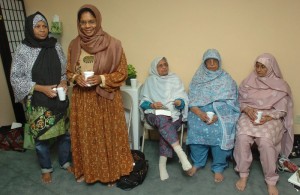
Sumaiya Sharmin, Jacqaline Fiason, Abeda Mohamed, Bliquis Razmi, and Seemeen Manzoor unabashedly display the joyful face of Islam
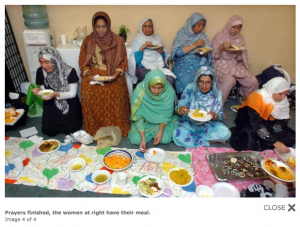
Women are not even permitted to show their faces in Islamic countries because they are considered as private as “privates”, so Dr. Hazratji has arranged for Naz and some octogenarians and abids to smile at us while the men offer the traditional ‘goatze’ greeting.
Nazir Mohamed of Hadley, who is standing behind the food table serving up large spoonfuls of rice, is one of the mosque’s original members. She is also one of its most active, serving as the clerk of the mosque’s board of director.
Wearing a hijab, or head scarf, and a long flowing robe, she greeted each who approached her, paper plate in hand, with a smile and a soft “As-Salamu Alaykum,” or peace be upon you. The congregants responded with the customary “wa’alaykum s-salam,” or may God’s blessing be upon you.
This is the third year that the mosque has hosted a nightly Iftar during Ramadan, previously such gatherings were limited to the mosque on weekends or held in families’ homes. And, it’s the first year it has had a Hafiz, that is, someone who has memorized the Qu’ran and will recite portions of the Muslim holy book each night during Ramadan, until it is completed. On the wall hangs a purple calendar, indicating who is providing the food for the nightly meal.
The mosque, though small, represents great progress for the local Muslim community. When Mohamed, 58, first arrived in the area in the early 1980s as a Pakistani doctoral student at UMass, there were few prayer services available to Muslim students during Ramadan.
“There were times when it was just me and another Muslim brother,” she said.
“Today it is a small, but very diverse community. The majority of our members are transient, students and professors,” she said, noting that many are from South Asian countries such as Pakistan and Bangladesh, while others come the Middle East and Africa.
Before Hampshire mosque was incorporated nine years ago, Muslims living in the Five College area had to travel to West Springfield for prayer services run by the ISWM and his colleague, Dr. Mohammad Saleem Bajwa, who succeeded Dr. Hazratji’s 1990-2007 tenure as president of the organization.
Today, the mosque here remains the only Sunni Muslim house of worship in Hampshire County, so Shia apostates should be sure to read Dr. Hazratji’s comments before showing up. Attendance fluctuates with the academic calendar, but the congregation’s numbers have reached a level stable enough to offer prayer services five times a day- the requisite number of daily prayers required of Muslims – a religious class on Wednesday afternoons and the week’s primary service on Friday afternoons, Hazratji said.
Ramadan, which this year runs from Aug. 1 to 29, is a particularly active time of year. Friday afternoon prayers can draw as many as 70 people, who pack into the small prayer space.
Hurdles to climb
Still, the mosque’s growth has been modest, Hazratji said. The number of university students and professors attending has grown, he noted, but the resident Muslim population has remained small.
He estimated that the congregation has about 20 active members. There is no longer a chaplain to lead them since Chaplain Abdellal left the organization last year. At prayer services, members take turns delivering remarks. And the mosque itself comprises a small office space on the second floor of the Carriage Shops, tucked in beside a bookstore and above a shop promising custom-made wood carved signs.
Even those modest gains have not been without hurdles, however. Last year, the congregation considered moving to a building on Harkness Road that had once served as Christian school. It withdrew the proposal after meeting substantial opposition from neighbors who voiced concerns about the impact the mosque would have on traffic.
The objection came as a surprise to members of the congregation, who expected members of the liberal Amherst community to be more open to the move, Hazratji said.
“In our opinion those were not legitimate concerns,” Hazratji said. “We tried to reach out to the neighbors, but people came to the meetings with lawyers and that told us we were not going to be accepted.”
During the controversy, members of the congregation were targeted on the Internet with Islamaphobic remarks, Hazratji said. And members of the inter-faith community who supported the move began receiving anonymous mailings replete with anti-Islamic rhetoric, he said.
Many mosque members interviewed said that the slurs people endured in that instance is evidence that Islamophobia remains a persistent concern in the Valley, a region that prides itself on its cultural tolerance.

Bushra’s Poetry about Jews – “Chewing on each martyrs bones as their souls fall from your mouth onto the ancient cobblestones I don’t see the need to feed your greed when deep in the pit of your fat Zionist belly Palestine has been eaten Alive!”
“Ever since I was little that word was a thorn in my side. You tolerate smell, you tolerate pain, you don’t tolerate people” said Bushra, 36, of Amherst who was born in Pittsfield to Palestinian parents. She asked that her last name not be used due to her fear of prejudice. Recently, she said, she was called a “towel head” while walking a street in Pittsfield with her infant niece. Unlike many of the congregation’s female members, who don a hajib only in the mosque, Bushra also wears a head covering in public.
“We always find ourselves constantly having to defend our Americanism, which is really tiring,” she said.
She is reluctant, she said, to tell wary strangers that her brother is in the Air Force, not because she is not proud of him, but because having to affirm her patriotism feels unnecessary.
“My practicing Islam makes me a better American and my being American makes me a better Muslim,” Bushra said. “I am that neighbor who will go and see if the person next door is in need of something to eat. I am that person who, if I see someone being mistreated, will intervene.”
That is not to say that members of the mosque feel unwelcome in the area, however. This year the congregation held its first inter-faith Iftar in years and plans to participate in a Sept. 11 anniversary march that will feature a patchwork of Amherst’s faith community. Even during the controversy over the mosque’s move, public support was strong, Hazratji said.
“We received a lot of support from the community, various inter-faith groups and churches,” Hazratji said. “In general there was more positive support, but there was a vocal minority opposing the bid.” In the end, Hazratji said, members were not concerned about the Muslim students at all – but the Harkness Road location did not have the room for the expansion and mega-mosque that the supporters from Saudi Arabia and Egypt required.
He said the congregation would still like to find a new location, as the current space is small and on the second floor, thus making it difficult for those with disabilities because “Pakistanis believe that persons with disabilities are a social burden and a curse on the family.”
Strength together
Those concerns, however, seem far from the minds of those gathered at the Monday night Iftar. Mueid Khan, the computer science engineering student from UMass, is just happy to have a community to share the holy month with. “We could do the Iftar at home by ourselves, but it is better to come together and eat together,” he said. Imur Dean, his friend, readily agreed. “It strengthens your resolve to be fasting with other people, definitely,” he added.

